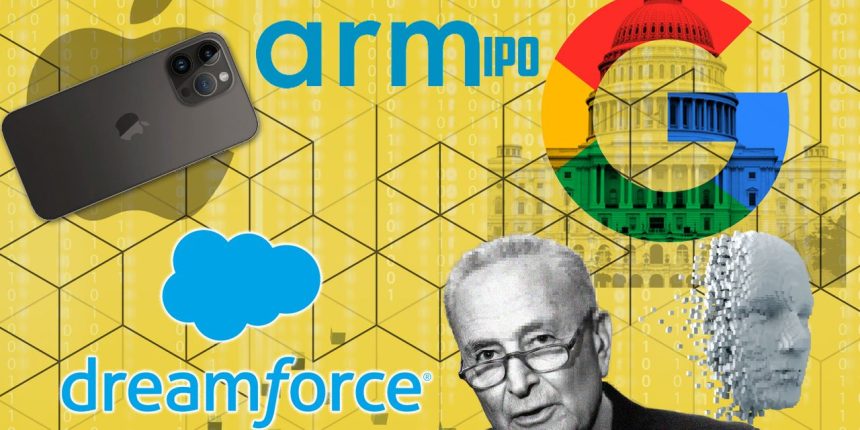The second week of September, as in the NFL, marks a kickoff of sorts for the tech year.
Headlined by Apple Inc.’s
AAPL,
seminal iPhone event on the second Tuesday of the month at Apple Park, and anchored by Salesforce Inc.’s
CRM,
wildly popular Dreamforce conference up the road in San Francisco, these several days set a tempo as well as establish a road map for the industry over the next 12 months. They also open the floodgates on tech conference season, with shows stacked up over the next several weeks for Facebook parent Meta Platforms Inc.
META,
Microsoft Corp.
MSFT,
and Oracle Corp.
ORCL,
Oh, and there’s that initial public offering from Arm Holdings Plc, the chip designer owned by SoftBank Group Corp.
9984,
that is expected to value Arm at $50 billion to $54.5 billion on a fully diluted basis. Another IPO candidate, grocery delivery company Instacart, also plans a public offering that would value it at $7.5 billion. Both deals could jump-start what has been a somnolent tech IPO market the past few years.
For that reason alone, this jam-packed tech week might hold even more import, and consequences, than previous years. A confluence of legal tussles, macroeconomic conditions, a trade war with China, and regulatory bluster have raised the stakes.
“It’s a tale of two cities with this week’s events highlighting both the issues and opportunities in tech,” Maribel Lopez, founder and principal analyst at Lopez Research, said in an email, assessing the week. “Arm’s IPO showcases the strength of tech and AI at a time when the AI forum and Google-DoJ shine a light on the concern that a few companies are wielding tremendous power for the future of the world.”
Added Daniel Newman, principal analyst at Futurum Research: “This week marks a convergence of big moments that span the newest gadgets to spur consumer and economic activity to testing the markets interest in IPOs to more big tech antitrust scrutiny.”
Consider: Hours before Apple is expected to unveil a new crop of iPhones more noteworthy for pricing than features, Alphabet Inc.’s
GOOGL,
GOOG,
Google faces off with the Justice Department in a federal court in Washington, D.C.
Justice Department officials argue that Google illegally leveraged agreements with phone makers such as Apple and Samsung Electronics Co.
005930,
and with internet browsers like Mozilla to be the default search engine for their customers, thus preventing smaller rivals from gaining access to that business.
“This is a backwards-looking case at a time of unprecedented innovation, including breakthroughs in AI, new apps and new services, all of which are creating more competition and more options for people than ever before,” Google General Counsel Kent Walker said in a statement.
The following day, Wednesday, Senate Majority Leader Chuck Schumer, D-N.Y., convenes an all-star panel of CEOs from Meta, Microsoft, Google, OpenAI and Palantir Technologies Inc.
PLTR,
As lawmakers ruminate on how to harness AI responsibly, bipartisan legislation is in the works. Sens. Richard Blumenthal, D-Conn., and Josh Hawley, R-Mo., are among those crafting a bill.
“We are very early in this process, but any framework is helpful,” Sumedh Thakar, CEO of Qualys Inc.
QLYS,
said in an interview. “There is a balance between regulation and innovation.”
Even Apple and Salesforce aren’t immune from recent events: Apple has endured a relatively rough patch of disappointing (for them) revenue and iPhone sales while balancing risk/reward with its huge investment in China, and Salesforce CEO Marc Benioff has threatened to relocate Dreamforce to Las Vegas after more than two decades in his hometown of San Francisco if drug use and homelessness disrupt this year’s event.
The most pressing concern, when all is said and done, is AI — which hovers like the Death Star over the tech landscape.
“The biggest concern is the forum is behind closed doors, which could lead to regulatory capture, where dominant players in the industry help influence the regulations being imposed,” Kimberlee Josephson, associate professor of business administration at Lebanon Valley College (Pa.), said in an interview. “It’s almost as if it puts them in the hot while giving them a seat at the table at the same time.”
“At the very least, it sends the signal that something is being done,” she said. “Antitrust cases are so subjective. What constitutes barriers to entry? DoJ adds a level of seriousness.”
Read the full article here




